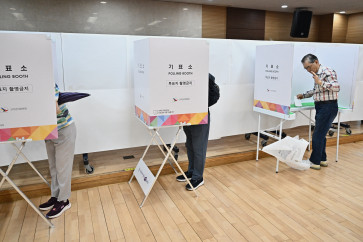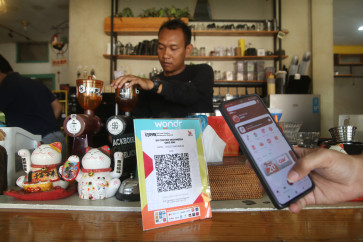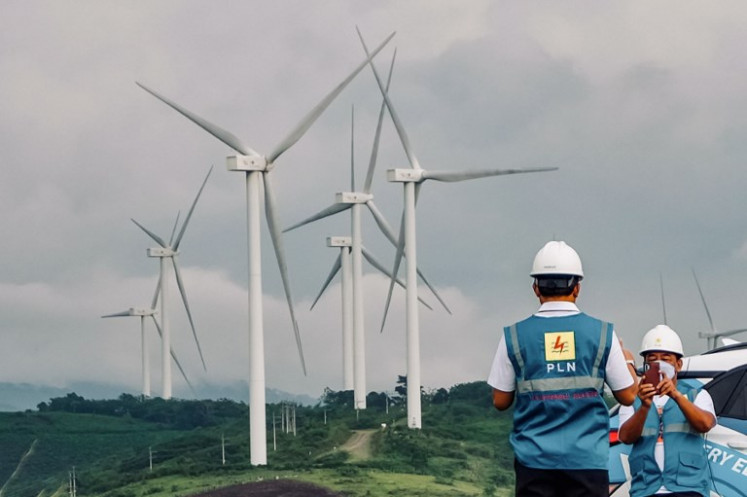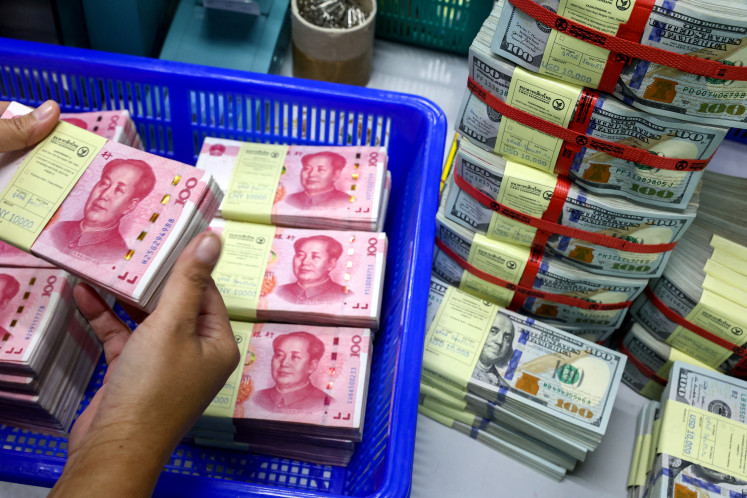Yasir Feri Ismatrada: A noodle maker with social mission
JP/Simon SudarmanThe product is known as mi lethek, meaning dull or ugly noodles
Change text size
Gift Premium Articles
to Anyone

JP/Simon Sudarman
The product is known as mi lethek, meaning dull or ugly noodles. Yasir Feri Ismatrada, who carries on the noodle business of his late grandfather Haji Umar Bysir Nahdi in Bendo village in Trimurti Srandakan, about 30 kilometers southwest of Yogyakarta, feels comfortable with the name.
'Mi lethek is far more famous than the brand name we've used, Garuda. Although it gives the idea of dirty and unhealthy food, I have no objection at all,' said the 38-year-old.
'The name doesn't harm our business in any way,' said Yasir, who manages the noodle factory set up in the 1940s by a man named Umar Nahdi from Yemen.
Consumers, however, need an explanation that the gray and dirty appearance of the noodles are not due to unhealthy processing, but rather because of the sap of sweet potato flour, a material used by Garuda for making noodles. Without additives and preservatives, lethek noodles have a shelf life of a year.
'Many people describe our noodles as organic and a traditional food fit for consumption by children with autism and also for making fried and boiled noodles, mixing with soto, bakso and even for preparing a spaghetti-style dish,' Yasir said.
With 40 workers, a factory measuring over 3,000 square meters and monthly production of 20,000 tons, the business maintains an atmosphere of modesty. Yasir, as the boss of Garuda, shows that he is no different from the other workers by joining the process of making noodles.
'It's a working method handed down by my grandfather. This business emphasizes its Islamic social mission of promoting the local people's welfare, instead of being merely oriented toward profit making. My children will inherit this tradition,' said the graduate of Muhammadiyah 3 senior high school in Yogyakarta.
'There's no retirement here, let alone dismissal. Local residents are given job opportunities here. In this way, our workers today range in age from 25 to 70,' Yasir said.
As a community oriented business, the management caps its profits at 10 percent, prioritizing the interests of employees. Yasir said that the firm was aware of its religious duty, such as in the period when his grandfather ran the show and the firm built houses for its workers without decent dwelling places.
According to Yasir, tax officers inspecting the business were surprised as they examined the factory's income and expenditures. 'I showed them all the transaction data for their scrutiny. As an enterprise with a social orientation, our income is very small ' just enough for survival. I also avoid using machines out of fear of unemployment,' he said.
Mi lethek is produced by traditional means. A one-ton stone cylinder, rotated by cows, is used to grind flour. Elderly workers pack hundreds of woven bamboo trays with noodles for drying in the factory yard. Garuda noodles are sold for Rp 8,000 (80 US cents) per kilogram.
In 2011, Yasir was happy to hear from Jakarta that the Agriculture Ministry would give the firm a grant, although it has failed to materialize despite the submission of various grants.
'I've submitted dozens of proposals to all levels of government. Almost every official visiting our displays suggested the same thing after seeing that this business was worthy of aid. But none have worked out,' Yasir said.
Mi lethek actually has a good market potential. With a production capacity of only 20 tons per month, the market demand for this product stands at 50 tons per month. So far, it is only available in Yogyakarta.
'I dare not offer other regions. They will only be disappointed, as we have no stocks left,' Yasir said.
But Yasir is convinced that he can expand his factory and human resources to produce at least 50 tons a month if he gets a grant of Rp 1 billion, which he plans to spent on infrastructure, boosting production, transportation and recruitment.
Yasir made contacts with several Middle East countries at a trade show in Jakarta in 2008 who said that Garuda noodles met export standards for their part of the world.
'Sadly, the Food and Drug Control Agency rejected our product due to the use of cows. It's ironic, because in 2008, President Susilo Bambang Yudhoyono was already our customer and our product could also be found in many shopping centers. But I wonder why the use of cows in noodle making was made an issue while this is just the traditional feature of our business,' added Yasir.









